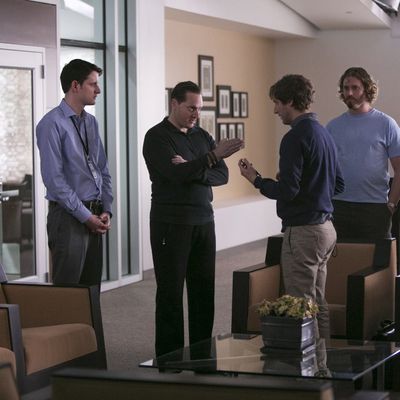
The advance coverage of Silicon Valley, HBO’s new Mike Judge-created send-up of the tech industry, more or less assumes that the real Silicon Valley should be running scared. Silicon Valley “mercilessly satirizes the excesses of a world it knows well,” wrote the Huffington Post. The show “lampoons the culture of digital innovation with great fervor,” according to Salon, and “gives the fuckers the graceful slap across the face they need,” according to Valleywag.
And yet, for all the hubbub about how harsh Mike Judge has been on the tech industry in his latest series, I know of at least three Silicon Valley viewing parties being held at the homes of prominent Silicon Valley entrepreneurs. The tech industry, it seems, is psyched to be punished.
First, about the show: As my colleague Matt Zoller Seitz wrote, it’s very good. The plot revolves around Richard Hendricks (Thomas Middleditch), a young programmer who accidentally invents a very good file-compression algorithm. Richard gets a big investment from Peter Gregory (Christopher Evan Welch), an eccentric venture capitalist modeled after Peter Thiel, and sets about building his company, Pied Piper, with help from a band of misfits who live with him in a start-up incubator. Along the way, Richard is schooled in the ways of business (“You’ve got to be an asshole,” Erlich, the incubator head, tells him. “If you are not an asshole, it creates an asshole vacuum, and that void is filled by other assholes.”) and learns to navigate Silicon Valley’s bizarre power structure. The show mocks Silicon Valley’s quirky obsessions (start-up names with missing vowels, Thiel’s skip-college movement), and sends up the industry’s humanitarian rhetoric. “If we can make audio and video files smaller, we can make cancer smaller!” the show’s Marc Benioff impersonator tells Richard.
What I fear will happen with Silicon Valley is the same as what happened with Oliver Stone’s Wall Street. Like Stone, a stockbroker’s son, Judge – who had a short-lived career as a programmer before going to Hollywood – is something of an insider to the world he writes about. Stone meant to shine a light on the financial industry’s excesses – and steer young people away from Wall Street – by introducing the character of Gordon Gekko, a suspenders-wearing high-roller with a penchant for pinstripes and illegal insider trading. Instead, a generation’s worth of young people watched Stone’s version of events and decided that working on Wall Street sounded fantastic. What was meant as a scared-straight campaign about the dangers of the “greed is good” ethos became, instead, a recruiting video for the financial industry.
Silicon Valley may well fall into the same trap. The entire show is meant as a farce. It’s packed with stereotypes, obliviousness, and tech nerds behaving badly. And yet, the picture it paints is more charming than damning. You can imagine an NYU student watching it and thinking, Is it too late to switch my major to computer science?
It’s no surprise that Silicon Valley – the real one – isn’t taking much offense at being lampooned onscreen. (When the show was screened for a tech-heavy audience in Redwood City last night, the Wall Street Journal reports that “the audience chuckled knowingly.”) For all his mockery, Mike Judge is still telling the tech industry things it believes about itself – that it’s filled with hyperearnest do-gooders, that genuinely good ideas are found and funded in Silicon Valley, that techies are our new economic overlords – and that affirmation makes all the barbs sting less.
Again, Silicon Valley is a very good show, and it’s the most accurate portrayal of the tech industry that has appeared in major media in many years. But — at least in the first three episodes — Judge could have dug deeper than the easily mocked peccadilloes of Silicon Valley and explored some of the more nefarious elements of tech culture. Start-ups premised on blatant end-runs around regulation. Corporatist apologias masquerading as grassroots social movements. Secessionism and anti-democratic sentiment run amok. Data-harvesting with the NSA. The gig-ification of the economy. Expansive poverty and rising inequality in Silicon Valley’s backyard.
By keeping things so light, Silicon Valley seems to be leaving a lot on the table. I can’t help but wish that the show was a little more House of Cards and a little less Veep.
There’s a scene, in episode three, when one of the show’s protagonists goes on a psychedelic mushroom trip and, while high, starts free-associating using start-up jargon: “Cloud-based disruptive platforms! Cross-platform, business-facing!” He ends up in the desert, obsessively chanting: “Making the world a better place. Making the world a better place.” It’s a very funny scene, and we’re meant to snicker down our noses. Look at those weirdos, thinking they’re important for making dumb apps!
But the tech industry is important. It’s reshaping culture, rewriting the rules, and embedding itself in the national agenda in ways that will take decades to successfully untangle and understand. That’s the urgent thing to understand about the tech industry, not the goofy start-up names and Burning Man idealism. The funniest parts of the real Silicon Valley might be techies trying to change the world and failing. But the scariest parts are the ways in which they’re succeeding.





























